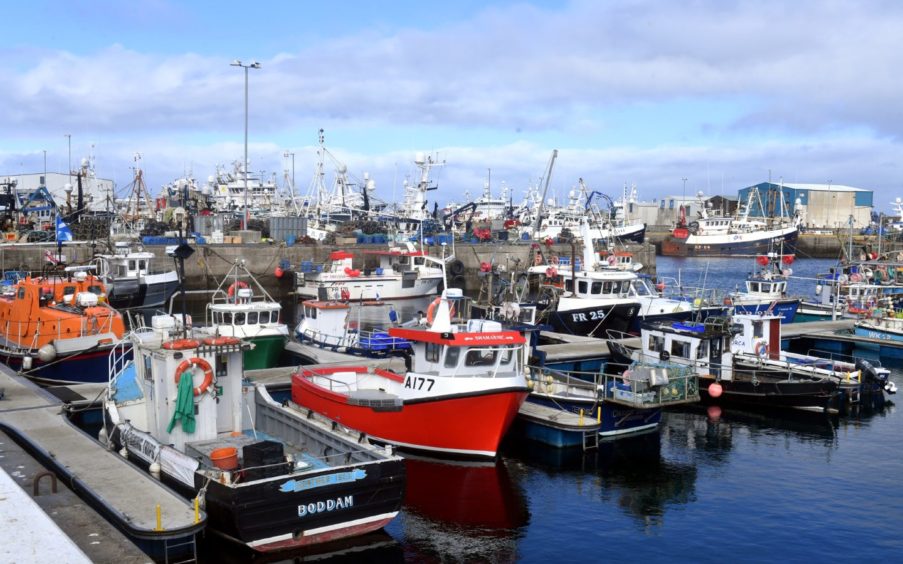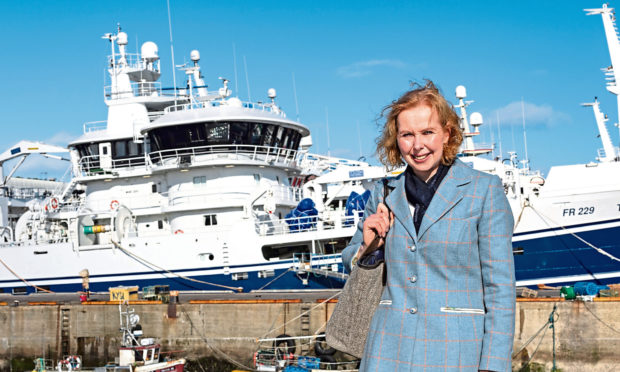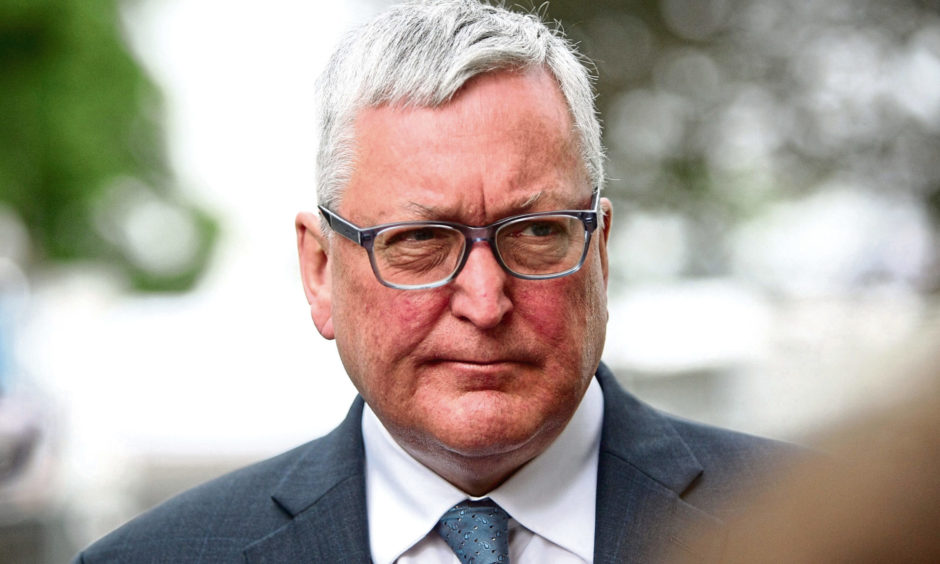Scottish fishing industry chief Elspeth Macdonald has written to the prime minister voicing anger over the mounting financial losses faced by vessels on top of the “desperately poor” Brexit fisheries deal.
And the Scottish Government has called on the UK Government to bolster support for Scotland’s struggling seafood sector.
In her letter to Boris Johnson, Ms Macdonald, chief executive of the Scottish Fishermen’s Federation, said: “Many fishing vessels are tied to the quay wall.
“Of the others that can go to sea, some are now making a 72-hour round trip to land fish in Denmark, as the only way to guarantee that their catch will make a fair price and actually find its way to market, while still fresh enough to meet customer demands.
“This, on top of the desperately poor deal on fisheries in the Trade and Cooperation Agreement, is not what you promised the fishing industry.
‘Acute problems’
“In your letter to me of July 6, you said: ‘We are simply not prepared to agree to an arrangement that is manifestly unbalanced and against the interests of the UK fishing industry.’
“Yet that is what has been agreed. We find ourselves with an outcome where the EU fleet will continue to have full and unfettered access to UK waters until the middle of 2026, and should the UK want to change these arrangements at that point, the EU can impose a suite of punitive sanctions on the UK. No other coastal state in the world is in this position.
“You and your government have spun a line about a 25% uplift in quota for the UK, but you know this is not true, and your deal does not deliver that.
“Your deal actually leaves the Scottish industry in a worse position on more than half of the key stocks and now facing acute problems with North Sea cod and saithe in particular. ”

Ms Macdonald added: “This industry now finds itself in the worst of both worlds. Your deal leaves us with shares that not only fall very far short of zonal attachment (a share of the stock residing within a country’s economic zone, the SFF’s preference for allocating quotas) but in many cases fail to ‘bridge the gap’ compared to historic catches, and with no ability to leverage more fish from the EU, as they have full access to our waters.
“This, coupled with the chaos experienced since January 1 in getting fish to market means that many in our industry now fear for their future, rather than look forward to it with optimism and ambition.
You and your government have spun a line about a 25% uplift in quota for the UK, but you know this is not true and your deal does not deliver that.”
Elspeth Maconald, chief executive of the Scottish Fishermen’s Federation
“Your deal does provide a glimmer of hope for better times ahead, beyond 2026, if whoever is in power then makes the right decision – the decision that you should have made – for the UK to genuinely be an independent coastal state and not one in name only.
“Your deal has failed the industry in the short term, but there is scope to right its wrongs, and your government needs to commit to doing everything that it can to achieve this.
“The current situation however is such that many in the seafood supply chain fear they will not survive to see that opportunity materialise.”
There is huge disappointment and a great deal of anger about your failure to deliver on promises made repeatedly to this industry.”
Mr Johnson has said fishing businesses affected by the delays in getting their produce to market since Brexit will be compensated for their losses.
Ms Macdonald said: “We expect to see the details of this compensation scheme as a matter of urgency and, of course, this must be new money, and not taken from the £100 million that you have already announced for investment and innovation.
“There is huge disappointment and a great deal of anger about your failure to deliver on promises made repeatedly to this industry.
“We will have another chance to revisit this in 2026, so there is much to do between now and then to prepare the ground for that.
“But for now, the priorities must be your government securing enough fish though the talks currently taking place with the EU and Norway for 2021 to, as a minimum, bridge the gap that your deal failed to, and acting immediately to stem the losses that are mounting up and compensate those businesses already affected. ”
We will invest in our fishing communities and do everything we can to help to rebuild the industry.”
A spokesman for the prime minister said: “We have now taken back control of our waters and the agreement we have reached with the EU secures a 25% transfer of quota from EU to UK vessels over five years, starting with 15% this year.
“This will bring immediate gains to our fishermen and women across the whole UK.”
“Throughout the adjustment period, we will invest in our fishing communities and do everything we can to help to rebuild the industry.
“The prime minister has already committed to investing £100m in the UK’s fishing industry and provided the Scottish Government with nearly £200m to minimise disruption for businesses.
“As the PM said this week, we recognise the Scottish fishing industry is facing some temporary issues following the end of the transition period, and we are looking at the additional financial support we can provide to those businesses affected.”
The industry in Scotland has basically ground to a halt and businesses that employ hundreds of people in communities around our coastline are losing money.”
Jimmy Buchan, chief executive of the Scottish Seafood Association
The governments in Edinburgh and London are blaming each other for a log-jam of seafood lorries – due to red tape – at export distribution facilities in central Scotland.
IT problems on both sides of the Channel have also delayed Scottish exports to key markets in Europe.
One seafood firm, Aberdeen-based John Ross Jr, has accused the UK Government of “gross incompetence“.
Seafood export woes have left about a third of the Scottish fishing fleet tied up in port after a slump in the value of its catch.
Scottish Seafood Association chief executive Jimmy Buchan urged the UK and Scottish governments to “get a grip” of the crisis amid very few signs of improvement two weeks into the year.
Mr Buchan said: “There has been a lot of direct engagement between the industry and ministers and civil servants in recent days, and plenty of soothing words about resolving ‘teething troubles’.
“But these are not minor impediments to trade. The industry in Scotland has basically ground to a halt and businesses that employ hundreds of people in communities around our coastline are losing money. In some cases they are close to going under.
“It is time for our governments to get a grip of what is now a full-blown crisis, and fast, before severe and lasting damage is done to the sector.”
Urging the UK Government to act quickly, Rural Economy Secretary Fergus Ewing has called for:
- “Urgent” compensation to be provided to affected businesses in coastal communities and across Scotland.
- A formal request to be made to the EU for a grace period to sort out and simplify the bureaucracy.
- Streamlining of the bureaucracy that the UK Government has put in place as a result of the deal, with paperwork and IT systems to be “urgently” looked at.
It is scandalous how Scotland’s seafood sector has been treated since the end of the EU exit transition period.”
Rural Economy Secretary Fergus Ewing
The sector is currently facing a series of challenging impacts due to new non-tariff barriers in the Brexit deal.
This is compounded by the coronavirus pandemic affecting both national and international trade, with hospitality supplies significantly curtailed at home and abroad.
Mr Ewing said: “It is scandalous how Scotland’s seafood sector has been treated since the end of the EU exit transition period.
“Previously booming businesses have been left to rot as a result of extensive bureaucracy forced on them by a poor Brexit deal.
“Relationships and contracts that have been in place for decades are ending. World-class food is being unnecessarily wasted. Family businesses are failing.
“It is imperative that the UK Government acts, and acts now, to provide adequate support to these businesses.”
Mr Ewing added: “I’ve met with the sector multiple times this week to hear their concerns and work out what we can do to alleviate these issues.
“Following on from our most recent meeting, I urge the UK Government to take action and compensate businesses, streamline processes and seek a grace period with the EU.
“Scotland’s food and drink industry is revered globally. We cannot let it suffer any longer. The Scottish Government will work constructively with relevant partners to do all we can to support.”

